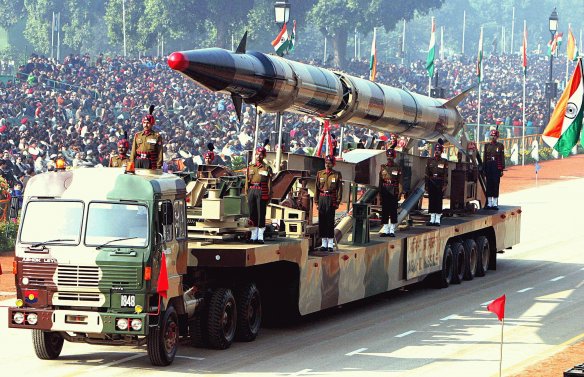India’s Nuclear Policy has been the subject of debate for many decades now. A non-signatory to the Nuclear Non Proliferation Treaty, the country has pursued an atomic bomb amid regional tensions and precarious relations with its neighbors. India has also used its nuclear weapon to bolster its national identity tied to the concept of ‘security’.

An Indian Agni-II intermediate range ballistic missile on a road-mobile launcher, displayed at the Republic Day Parade on New Delhi’s Rajpath, January 26, 2004. Photo: Antônio Milena
Despite all this, the state has been provided tacit support for its nuclear program and given back door entry into the Nuclear Suppliers Group. As a recognized nuclear weapons state, India has been integrated economically as well as politically into the international system.This text explores the different facets of India’s nuclear behavior that provide explanations for the special status the state has received.
A state’s behavior is closely perceived by the international community. Decisions taken convey trust or mistrust, based on how the international community comprehends the choices in question. for India, this trust was developed with a umber of factors, one of which was its adherence to the norms of non-proliferation.
This was in stark contrast to states such as Iran that were signatories to the treaty, and still were found to be part of nuclear proliferation. Almost every state to the East of Europe has been involved in nuclear proliferation, be it Israel, South Africa, China or North Korea.
India, with a zero proliferation record stands tall amongst the other outlier states. New Delhi has, in addition, regularly strengthened its export and procurement lists with those of the Nuclear Suppliers Group and with the Missile Technology Control Regime. It is also a part of the UN Security Council Resolution 1540 on the Non-Proliferation of Weapons and the Weapons of Mass Destruction Act of 1995 on tightening export controls.
As a state that was ready to test in 1966, India held on to its desire of being a part of the nuclear club for a long time. Incidentally, every time the state took a step in the direction of developing its nuclear program, it proposed a disarmament initiative to the international community in the hope that a global nuclear structure could be brought about, that would reduce nuclear weapons as a military option:
- In 1954, India proposed an end to nuclear testing in the light of the British and Soviet Nuclear Tests;
- in 1965 India favored the talks for a non-discriminatory treaty banning nuclear proliferation, but walked out of the NPT due to its discriminatory nature;
- in 1978, after conducting a Peaceful Nuclear Explosion, India called for negotiations for an international convention prohibiting the use or the threat of use of nuclear weapons;
- and a landmark initiative was announced in 1988 as the Rajiv Gandhi Action Plan. The detailed plan has acted as a guiding light for other disarmament initiatives such as
- the Seven Point Agenda for Disarmament announced in 2008 and
- the 2011 Informal Group that was constituted by the then Prime Minister Dr. Manmohan Singh.
India’s growing economy and its consistent regard of international borders have also added to the growing trust it has developed in the international system. The state showed restraint during the Kargil war by not crossing the Line of Control and even after the Mumbai Attacks, it chose to engage in a dialogue with Pakistan.
The nuclear behavior of India, thus, speaks to the international community and generates the desired trust. An example of this trust is the Indo-US Nuclear Deal that allows for the state to be integrated not just into the nuclear club but also in the political and economic growth of the world. This trust is more evident in comparison to the recent Iranian Nuclear deal, also known as the Joint Comprehensive Plan of Action. The JCPOA, to quote the US President is based on stringent ‘verification and not trust’, while the nuclear deal with India is based on the trust the state developed over a period of six decades.
Thus, India’s nuclear behavior can be used as ‘learning’ for aspirational states on what is acceptable behavior and how states can aim for deeper integration into the international community.